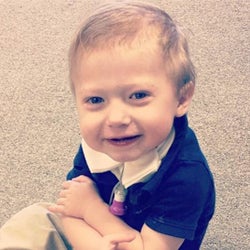Tracheobroncomalacia
When Jake and Samantha Pendleton welcomed their fourth child, Jude, the family was ecstatic. But that excitement was soon overshadowed by apprehension when Jude began experiencing serious breathing issues at just 8 days old. “He hadn’t been eating well, and then one day he became extremely lethargic,” Jake said. “We realized he was having respiratory distress.” Jake and Samantha rushed Jude to their local hospital in Dothan, Alabama, then Children’s of Alabama’s Critical Care Transport team flew Jude via helicopter to Birmingham, where he spent the next three days on a ventilator. “Seeing him on the ventilator was obviously very emotional for us,” Samantha said. “But after three days, he was weaned off and we thought everything was going to be fine.” A test later revealed liquid collecting in Jude’s lungs, prompting doctors to insert a tube before Jude’s release. But every few weeks, Jude would again go into respiratory distress, requiring more hospitalizations. Doctors then performed a bronchoscopy, which revealed Jude’s central airways were soft and weak – a rare condition known as tracheobronchomalacia (TBM). TBM in children is believed to run in families. “It was so severe that there was nothing they could do,” Jake said. “The only option was to put in a tracheostomy, put him back on a ventilator and hope that as he grew the problem would correct itself. But he had such a severe case that it wasn’t likely.” Jake, who is in the medical profession himself, knew of a pediatric surgeon at Boston Children’s Hospital who pioneered a procedure for Jude’s diagnosis. “He had only performed the procedure a handful of times, but we knew it was our only option,” Jake said. “We had to get him to Boston for that procedure.” Jude was flown to Boston for the procedure, which also revealed he had an artery compressing the back of his trachea. In addition to the posterior tracheopexy, he also endured an aortopexy to correct the artery. “It was a long 12-hour surgery, but it was successful,” Jake said. “He previously had an 80 percent collapse in his airways and after the surgery it was just 15 percent, which is sustainable.” After four months in Boston, Jude was transferred back to Children’s, where Jake and Samantha were taught how to manage a home ventilator, as Jude would still need a ventilator while he slept. Once prepared to manage it, the Pendletons were discharged home. While Jude still continues to experience respiratory problems—and sometimes unanticipated hospitalizations—he’s doing well. He goes to physical, occupational and speech therapies each week, he’s walking and he’s also learning how to use his voice and making purposeful verbal sounds. “This is our new normal,” Jake said. “We try not to have any expectation about what will happen, but we are thankful for every day God gives us with Jude. We are hoping the next part of his journey will be coming off the ventilator.” While Jake and Samantha obviously don’t know what the next phase of Jude’s journey will be, they are thankful he has come this far and that the journey has brought them to Children’s. “We’ve built such great relationships with the doctors and nurses at Children’s,” Samantha said. “It’s amazing to see how much they care for Jude and our whole family.”







